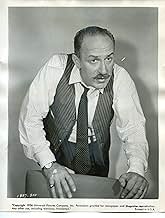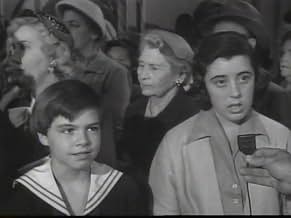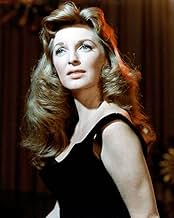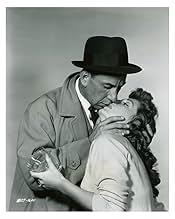Ajouter une intrigue dans votre langueJoe Harris, preparing a eulogy for popular radio commentator Herb Fuller, finds that nobody has a good word to say about him.Joe Harris, preparing a eulogy for popular radio commentator Herb Fuller, finds that nobody has a good word to say about him.Joe Harris, preparing a eulogy for popular radio commentator Herb Fuller, finds that nobody has a good word to say about him.
- Réalisation
- Scénario
- Casting principal
- Nomination aux 1 BAFTA Award
- 3 nominations au total
Edward Platt
- Dr. O'Connor
- (as Edward C. Platt)
Dorothy Abbott
- Stewardess
- (non crédité)
Walter Bacon
- Mourner
- (non crédité)
Avis à la une
Josè Ferrer both directed and starred for the first time in this movie that is a bit reminiscent of CITIZEN KANE about the true story of a famous journalist. Despite is not a classic like KANE, it's still pretty good.
Radio reporter Herb Fuller is killed in an car accident and this causes crisis in the ABC radio station. Joe Harris (Ferrer), his replacement, has to do as first assignment a one hour show discussing the life and career of the deceased journalist. As he interviews fans and the people that knew him, Harris discovers that the man hasn't really a nice reputation as it seemed. How he will discuss its life? See the film by yourself.
Josè Ferrer directs nicely and his performance is what lifts the movie. As always he has lots of charisma and no-nonsense lilt. He is surrounded by various supporting actors of those years: Edward Platt, Keenan Wynn, Jim Backus, Lyle Talbot and even gorgeous Julie London as one of Fuller's former girlfriends. However, while not a classic, it's still a very good movie in its own way and worth seeing as well.
Radio reporter Herb Fuller is killed in an car accident and this causes crisis in the ABC radio station. Joe Harris (Ferrer), his replacement, has to do as first assignment a one hour show discussing the life and career of the deceased journalist. As he interviews fans and the people that knew him, Harris discovers that the man hasn't really a nice reputation as it seemed. How he will discuss its life? See the film by yourself.
Josè Ferrer directs nicely and his performance is what lifts the movie. As always he has lots of charisma and no-nonsense lilt. He is surrounded by various supporting actors of those years: Edward Platt, Keenan Wynn, Jim Backus, Lyle Talbot and even gorgeous Julie London as one of Fuller's former girlfriends. However, while not a classic, it's still a very good movie in its own way and worth seeing as well.
I fully agree with the reviewers who call this film a neglected or overlooked gem. I was drawn to watch it by the excellent cast - Jose Ferrer, Dean Jagger, Jim Backus, and assorted character actors who do outstanding work. And of course the Wynns, both father and son, in what is probably one of the few - if only - films they made together. Another draw was the rumor that Arthur Godfrey may have been the "great man" on which the story is built. Regardless of that, it's a superb portrayal of the cynicism of the entertainment world. As is made clear, selling product is the be-all and end-all, and a star's good or bad personal qualities are irrelevant. As many reviewers have said, Ed Wynn's brief appearance is a reminder of how great an actor he was. I think his son Keenan acquits himself also, and Dean Jagger is always good. I applaud Jose Ferrer's scriptwriting and direction, but I think his performance is a bit stiff and dry. The only reason I gave 7 stars and not 8 is that I thought the conclusion was a bit abrupt. However it is a very good, well acted story that is well worth watching.
This is a very interesting film for a variety of reasons. In many ways, it's a CITIZEN KANE knock-off, but sometimes in reverse. We see the reporter who is putting together the story of the great man, but we never see the great man himself. As in "Kane," the ex-wife is an alcoholic singer. There is also a "Rosebud" of sorts-a deathbed obscenity. Well worth watching!
The immense influence Orson Welles' CITIZEN KANE (1941) has had on the language of cinema is well documented. So, to a lesser degree, is the freedom it gave film-makers – not always of comparable talent – towards (vaguely autobiographical) self-indulgence in their work. Yet another ripple it undeniably created (actually borrowed from THE POWER AND THE GLORY {1933}, which I own but have yet to watch!) led to a whole series of films taking a sour look at the American dream, depicting – via their flashback structure – the rise and fall of a successful but, at heart, unscrupulous public figure. Among these are RUTHLESS (1948), ALL ABOUT EVE (1950), THE BAD AND THE BEAUTIFUL (1952), Welles' own MR. ARKADIN aka CONFIDENTIAL REPORT (1955), THE Oscar (1966), etc.
THE GREAT MAN, then, is one such effort – and an unfairly neglected example into the bargain (even if both the Leslie Halliwell and Leonard Maltin movie guides are duly complimentary in their assessment) which rather suggests that it stands up better than other, more renowned titles in this vein! It also emerges as the most significant directorial venture by star/co-writer Ferrer. For the record, I own all 7 of the pictures he helmed – but, perhaps tellingly, this was only the second I have checked out (and which I opted to watch on the occasion of his birthday). Given the Oscar winner's reputation as a thespian, his choice of 'personal' projects was – for the most part – curiously bland and commercial in nature!
Setting this apart from the established formula is the fact that the subject of the expose' is never shown; we only learn about him – and, consequently, formulate our own opinion – from the way others (who knew him intimately, professionally or just vicariously through his popular radio show) react to news of his passing in a traffic accident. Besides, running concurrently with the main plot (the compiling of information by a small-time radio personality – played by Ferrer himself – for a "heart-rending" eulogy, to be delivered in a live broadcast by the network to commemorate "the great man") are the hero's conflicting emotions about his increasingly unpleasant and "phoney" task especially since he was being all but promoted as the deceased's successor on the airwaves!
Ultimately, the trump-cards here – which make all the difference – are the smartly cynical script (co-adapted by novel author Al Morgan) and a first-rate cast that, apart from Ferrer (in fine form), includes: real-life father and son Ed and Keenan Wynn (credited with, respectively, discovering and nurturing the ungrateful and opportunistic titular character); Julie London (as a chanteuse and his alcoholic mistress); and Dean Jagger (as the Machiavellian network head). Incidentally, the copy I viewed of this one was pretty substandard for the digital era (which has well and truly spoiled us movie-buffs, it must be said!) and, while a somewhat better-quality version does exist online, I had difficulty acquiring it...
THE GREAT MAN, then, is one such effort – and an unfairly neglected example into the bargain (even if both the Leslie Halliwell and Leonard Maltin movie guides are duly complimentary in their assessment) which rather suggests that it stands up better than other, more renowned titles in this vein! It also emerges as the most significant directorial venture by star/co-writer Ferrer. For the record, I own all 7 of the pictures he helmed – but, perhaps tellingly, this was only the second I have checked out (and which I opted to watch on the occasion of his birthday). Given the Oscar winner's reputation as a thespian, his choice of 'personal' projects was – for the most part – curiously bland and commercial in nature!
Setting this apart from the established formula is the fact that the subject of the expose' is never shown; we only learn about him – and, consequently, formulate our own opinion – from the way others (who knew him intimately, professionally or just vicariously through his popular radio show) react to news of his passing in a traffic accident. Besides, running concurrently with the main plot (the compiling of information by a small-time radio personality – played by Ferrer himself – for a "heart-rending" eulogy, to be delivered in a live broadcast by the network to commemorate "the great man") are the hero's conflicting emotions about his increasingly unpleasant and "phoney" task especially since he was being all but promoted as the deceased's successor on the airwaves!
Ultimately, the trump-cards here – which make all the difference – are the smartly cynical script (co-adapted by novel author Al Morgan) and a first-rate cast that, apart from Ferrer (in fine form), includes: real-life father and son Ed and Keenan Wynn (credited with, respectively, discovering and nurturing the ungrateful and opportunistic titular character); Julie London (as a chanteuse and his alcoholic mistress); and Dean Jagger (as the Machiavellian network head). Incidentally, the copy I viewed of this one was pretty substandard for the digital era (which has well and truly spoiled us movie-buffs, it must be said!) and, while a somewhat better-quality version does exist online, I had difficulty acquiring it...
Just as Charlie Kane was based on William Randolph Hearst, great man Herb Fuller was based on TV and radio icon Arthur Godfrey. I believe several of the story lines in Great Man paralleled events in Godfrey's life. The one that stands out involved a `boy singer' that was fired by Herb Fuller. In real life Arthur Godfrey fired `boy singer' Julius LaRosa. I have heard that Godfrey the `old redhead' was none too pleased with Jose Ferrer's film.
There is a brilliant scene in the film where the hard-boiled, cynical reporter Joe Harris (Jose Ferrer) meets a former employer of great man Herb Fuller, the guy who gave Fuller his start in broadcasting. Harris and his secretary make fun of Paul Beaseley (veteran actor Ed Wynn, who only has this one scene), a doddering old bumpkin who owns a small radio station in New England. Beaseley tells a story that reveals the two sides of Herb Fuller a folksy, down-to- earth radio personality that people love on the one hand and a mean-spirited, drunken rat bastard on the other. At the end of the scene Beaseley says something like, `I know that some people find me ridiculous' and Harris, no longer mocking Beaseley, replies, `Mr. Beaseley, I don't find you ridiculous at all'. This is one of my favorite movie scenes of all time.
There is a brilliant scene in the film where the hard-boiled, cynical reporter Joe Harris (Jose Ferrer) meets a former employer of great man Herb Fuller, the guy who gave Fuller his start in broadcasting. Harris and his secretary make fun of Paul Beaseley (veteran actor Ed Wynn, who only has this one scene), a doddering old bumpkin who owns a small radio station in New England. Beaseley tells a story that reveals the two sides of Herb Fuller a folksy, down-to- earth radio personality that people love on the one hand and a mean-spirited, drunken rat bastard on the other. At the end of the scene Beaseley says something like, `I know that some people find me ridiculous' and Harris, no longer mocking Beaseley, replies, `Mr. Beaseley, I don't find you ridiculous at all'. This is one of my favorite movie scenes of all time.
Le saviez-vous
- AnecdotesLoosely based on the career of Arthur Godfrey.
- GaffesWhen Joe, Mike, and Jinny are listening to the "blood bank" tape, the VU meter has no relation to the audio.
- Citations
Ginny: Feet of clay, huh?
Joe Harris: Right up to the knees, at least.
- Crédits fousFerrer modestly omitted himself from the cast list at the end of the film.
- ConnexionsVersion of Pretendent (1987)
- Bandes originalesThe Meaning of the Blues
Words and Music by Bobby Troup and Leah Worth
Performed by Julie London
[The song comes on the radio in Carol's apartment]
Meilleurs choix
Connectez-vous pour évaluer et suivre la liste de favoris afin de recevoir des recommandations personnalisées
Détails
- Date de sortie
- Pays d’origine
- Langue
- Aussi connu sous le nom de
- The Great Man
- Lieux de tournage
- Universal Pictures Building, 445 Park Avenue, Ville de New York, New York, États-Unis(Amalgamated Broadcasting building)
- Société de production
- Voir plus de crédits d'entreprise sur IMDbPro
- Durée1 heure 32 minutes
- Couleur
Contribuer à cette page
Suggérer une modification ou ajouter du contenu manquant

Lacune principale
By what name was Quand le masque tombe (1956) officially released in India in English?
Répondre





























